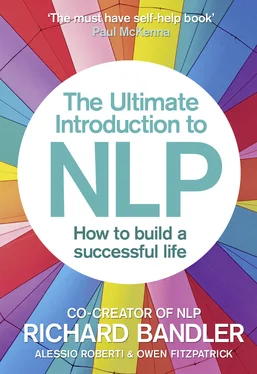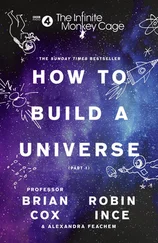Joe and Teresa exchanged glances, and he shook his head. All that stress over a makeup mirror , he thought. If this seminar is anything like the last, she’s really going to benefit from it.
Joe, Teresa and Emily went into the seminar room and found three seats together halfway up the centre aisle. Joe found himself placed between Teresa and a man in his fifties wearing a sharp suit and a pair of red designer glasses.
‘Hi, I’m Joe.’
‘Edgar Martin’s the name, changing lives is the game,’ said the man with a laugh. ‘Nice to meet you, Joe. What brings you here today?’
Joe grinned. ‘Long story short? A year ago I was in a bad place in my life and struggling with things. My sister convinced me to go to a seminar and, well, that turned some things around for me. I know NLP was involved, so I’m here to learn about it. How about you?’
‘That’s an interesting path you took, Joe,’ Edgar said. ‘I’m here to add a few tools to my toolbox, so to speak. I’m not a plumber, though. Well, maybe a plumber of the mind!’ Once again he laughed at his own joke. ‘I’m a psychiatrist and a psychotherapist.’
Joe smiled politely. ‘Cool,’ he said as he took out his personal journal.
‘Nice journal there, Joe,’ Edgar commented. ‘Do you take it everywhere you go?’
Joe nodded. ‘Well, not everywhere .’ He winked as he tried to match Edgar’s sense of humour, but all he got was a blank stare in response. Slightly red-faced, he continued, ‘I know from the last time that Richard Bandler teaches through stories, so you absorb a lot of ideas unconsciously, yet I also wanted to consciously capture some of his most memorable insights and observations throughout the workshop. I find taking notes to be a great way to review the key concepts and techniques.’
Edgar looked impressed. ‘It didn’t occur to me to bring along a journal, but I might look for one at the first break. Although really I should have brought my iPad – so I could have synchronized my database up here with my external memory!’
Pointing to his head, Edgar laughed again, while Joe nodded, this time failing to smile.
‘This is my first time learning from Richard,’ Edgar continued. ‘It’s just … I got so much from Alan, my first NLP trainer, that I figured it was time I learned from his mentor. Actually, Alan’s here today too, as an assistant.’
‘Oh, yes, I know Alan,’ Joe replied, suddenly intrigued. ‘What’s he like as a trainer?’
Before Edgar could answer, music began and Richard Bandler appeared at the back of the room. With a glance and a nod of the head, Edgar and Joe silently agreed to postpone their conversation. The seminar was about to begin.
Chapter 2
A BRIEF HISTORY OF NLP
As Richard Bandler walked towards the stage, Joe stared at him curiously. He had heard that top executives, Olympic athletes and even presidents of countries had benefited from NLP, but he still wasn’t sure what it was all about. He really wanted to understand it properly, and as Richard Bandler had been one of the co-creators of the field in the early 1970s, this seminar seemed the perfect place to start. He opened his journal as Richard began to speak:
Let me begin by giving you the background to all of this. When it started out – well, it was actually a fluke. My training was primarily in mathematics, logic and science, and when I was in college I moved into a house owned by a psychiatrist, and it was filled with books. Being an avid reader, I started reading them, waiting to get to the point where they said what you could do to help a patient.
Unfortunately the only book that I found that told you how to do anything was the book that told you how to prescribe drugs. If people were depressed, you could prescribe antidepressants for them. The worst part was that many of the people who took antidepressants were still depressed. It’s not much good when you take the drug and you go, ‘My life is still all screwed up.’
Being the practical guy that I am, I couldn’t believe that was it, so I started investigating further.
Now, if there’s one thing that’s kept me moving over the years, it’s the will to find simple ways to do difficult things. And this search has brought me in touch with some truly amazing human beings. Today I’ll tell you a little about some of them and the things I had the chance to learn from them.
In the beginning, all I did was go out and explore how people behaved: I was convinced there had to be a better way to organize information about how humans do things. When I met schizophrenics, I thought they were much like my neighbours – I couldn’t really tell the difference. They just had different ways of thinking about the world than others did. Their models or maps didn’t match other people’s experience.
In fact, the concept that the map is not the territory is one of the ideas that laid the foundations of Neuro-Linguistic Programming. It means that your understanding of the world is based on how you represent it – your map – and not on the world itself.
Joe had the feeling that this was important, so he paid close attention as Richard continued:
In order to understand the world, we map it in our brains. Now, to make a map, you go through three basic processes.
First, you delete part of the information. On a city map, you don’t draw the cars, you don’t see what the rooftops look like, and so on. And this a useful process – until you delete something important like a whole block of buildings and then try to drive through it because your map says there’s nothing there.
How many of you have experienced this: you’re walking down a familiar street and all of a sudden you notice what looks like a new shop. You walk in, ask how long it’s been open and find out it’s been there for five years!
The audience nodded. Joe remembered having that experience often.
Next, when making a map, you generalize. On a map, all state roads are represented the same way, regardless of how they actually look, and when you see a blue-coloured shape you expect it to be a lake or the sea.
Generalization is part of the learning process. You play with fire, you get burned, you learn not to touch things when they’re too hot. It’s a good thing. But then you have a partner who cheats on you and you decide all men are pigs – that might be an over-generalization. It’s not the process itself that is good or bad, it’s when and how you use it.
Last, you distort part of the information. A city map is usually smaller than the city itself, right? And it’s flat: it’s a print on a piece of paper. In life, you distort information every time you blow things out of proportion, whether you make them bigger than they actually are or whether you make them smaller.
Another, subtler way you distort things is this: you attach meaning to something that happened, or something that someone said or did. A colleague enters the room and she doesn’t greet you: you figure she’s angry, or upset, or offended.
And again, I don’t mean to say that distortion is necessarily a bad thing. In fact, it can lead to fairly accurate conclusions. What’s important is that you realize there’s a process going on and that the way you see things and the way they really are may be very different. And most important of all: whatever you think is going on, I want you to remember that it’s just a map. And it doesn’t necessarily match the map of the people around you.
Think about that the next time you end up arguing about who’s right and who’s wrong. As long as you stay with your own map, you’ll also stay convinced that you’re probably right. And the other person will stay convinced they’re probably right. When your map and the maps of the people around you don’t match, that’s when the trouble begins.
Читать дальше











